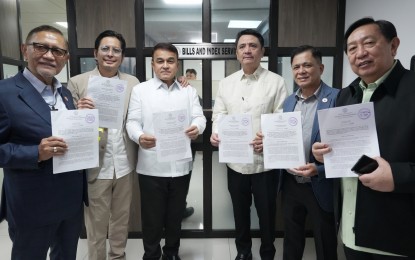
EJKs AS HEINOUS CRIMES. Lawmakers show a copy of House Bill 10986 they filed on Friday (Oct. 11, 2024) seeking to classify extrajudicial killings (EJKs) as heinous crimes. They are (from left) Manila Rep. Bienvenido Abante, Santa Rosa City Rep. Dan Fernandez Abante, Surigao del Norte Rep. Ace Barbers, Senior Deputy Speaker Aurelio Gonzales Jr., Abang Lingkod Rep. Stephen Joseph Paduano, and Antipolo City Rep. Romeo Acop. (Photo courtesy of the House Press and Public Affairs Bureau)
MANILA – A bill seeking to classify extrajudicial killings (EJKs) as heinous crimes, with harsher penalties for state agents and authorities found guilty of such acts, was filed in the House of Representatives on Friday.
Senior Deputy Speaker Aurelio Gonzales Jr., along with House quad committee co-chairpersons Robert Ace Barbers, Bienvenido Abante, Dan Fernandez, and Stephen Joseph Paduano and vice-chair Romeo Acop, filed House Bill (HB) 10986, or the proposed Anti-Extrajudicial Killing Act.
Based on recommendations from the Quad Committee’s (Quadcom) investigation into extrajudicial killings, the proposed legislation seeks to establish strict legal standards to address these crimes and hold perpetrators accountable.
“Extrajudicial killing or the killing of individuals without judicial proceedings or legal authority, poses a grave threat to the rule of law, democracy, and the protection of human rights. These acts bypass established judicial procedures, undermining public trust in the justice system and violating the basic rights to life and due process guaranteed by the Constitution,” the authors said in the bill's explanatory note.
The authors said the lack of accountability for such crimes contributes to a "culture of impunity."
"This bill seeks to explicitly criminalize EJK, ensuring that any individual, regardless of rank or position, who is found guilty of participating in, authorizing, or condoning such acts will face appropriate criminal penalties,” they said.
The bill proposes classifying EJKs as heinous crimes, subjecting those convicted to severe penalties, including life imprisonment or reclusion perpetua without the possibility of parole.
EJKs are defined as unlawful killings carried out by state agents or individuals acting with the consent or tolerance of authorities.
“Extrajudicial killing (EJK) refers to any killing other than that imposed by the State pursuant to the provisions of the Constitution on heinous crimes or a deliberate and arbitrary killing of any person not authorized by a previous judgment pronounced by a competent court affording all the judicial guarantees which are recognized as indispensable by civilized peoples,” the bill read.
HB 10986 outlines that any state agent found guilty of committing an EJK will face life imprisonment.
It further states that any superior military, police, or law enforcement officer or senior government official who issued an order to any lower-ranking personnel to commit an extrajudicial killing for whatever purpose shall be equally liable as principals.
The proposed law includes provisions for reparations to be paid to the families of victims through the creation of an Extrajudicial Killing Claims Board, ensuring that the state acknowledges the injustices suffered by victims’ families.
“The classification of EJK as a heinous crime is a necessary step to restore public confidence in the justice system and uphold the rule of law. It affirms the State’s duty to ensure that all individuals are afforded the protection of law and that justice is served in every case of unlawful killing,” the bill said.
“By adopting this measure, the State not only seeks to provide justice for victims and their families but also to send a clear message that all acts of violence outside legal processes will not be tolerated.”
During the Quadcom’s 8th hearing on Friday, Barbers vowed to render justice to victims of EJKs and human rights violations, among others, during the Duterte administration.
“We will continue to hear your stories, seek out justice and truth, and fight for your rights, in the face of threats to suppress them. Together we fight for dignity and honor. We can only craft protection if we know the truth. Those who violated our laws should be brought to justice,” he said.
The House, he said, would be open to any victim, family member, or witness who wants to share their sad experiences in the hands of rogue law enforcers involved in the Duterte administration’s brutal war on illegal drugs.
Barbers, lead chairperson of the Quadcom, emphasized that the Constitution empowers Congress to conduct inquiries in aid of legislation so it can make an informed decision in crafting or amending laws.
He lamented that while those behind EJKs have denied making money from their illegal activities, it is telling that they have engaged the services of high-profile lawyers known for their expensive billings. (With a report from Zaldy De Layola/PNA)
